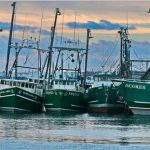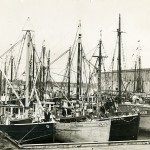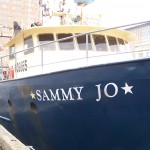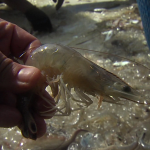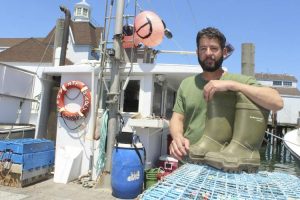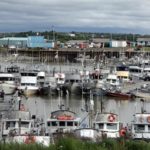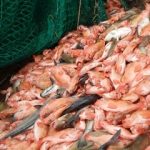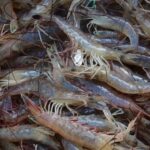Tag Archives: restaurants
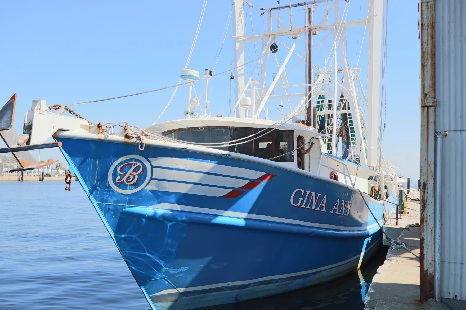
Amid ‘shrimp fraud’ reports, Tampa Bay area shrimpers need support
When restaurants charge a premium for Gulf-caught shrimp and pocket the extra profit by serving farm-raised imported shrimp, they’re denying local shrimpers a fair income. A recent study by SeaD Consulting revealed that 42 out of 44 Tampa Bay area restaurants surveyed were falsely passing off imported shrimp as locally caught. Local shrimpers say the effects of this kind of shrimp fraud go beyond betrayed diners. Shrimper Merritt Joseph Latino has been in the business for over 17 years. On one arm, underneath an anchor tattoo, the words “shrimpin’ ain’t easy” are permanently emblazoned in ink. Photos, more, >>CLICK TO READ<< 07:38
Restaurant Testing Exposes Rampant Shrimp Mislabeling in Savannah
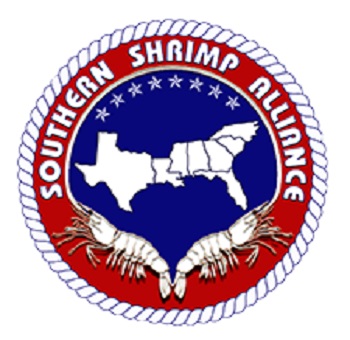 A recent investigation by SEAD Consulting reveals that 77% (34 of 44) of sampled restaurants in Savannah, Georgia falsely market their shrimp as premium U.S. wild-caught shrimp when they are actually serving farm-raised imported shrimp. The Southern Shrimp Alliance (SSA), representing the U.S. shrimp fishermen, processors, and related businesses across all eight Gulf and South Atlantic shrimp-producing states, including Georgia, commissioned the testing to highlight deceptive restaurant practices that harm local shrimpers, honest restaurants, and mislead consumers who expect a premium product. In 2024, SSA worked with the Federal Trade Commission (FTC) to inform seafood restaurants that it is a violation of federal law for restaurants to create an impression that they are offering wild-caught domestic shrimp when farmed, foreign shrimp is being served. Yet, the results of random testing underscore the urgent need for stronger labeling laws and enforcement to ensure transparency in the restaurant industry. links, more, >>CLICK TO READ<< 16:14
A recent investigation by SEAD Consulting reveals that 77% (34 of 44) of sampled restaurants in Savannah, Georgia falsely market their shrimp as premium U.S. wild-caught shrimp when they are actually serving farm-raised imported shrimp. The Southern Shrimp Alliance (SSA), representing the U.S. shrimp fishermen, processors, and related businesses across all eight Gulf and South Atlantic shrimp-producing states, including Georgia, commissioned the testing to highlight deceptive restaurant practices that harm local shrimpers, honest restaurants, and mislead consumers who expect a premium product. In 2024, SSA worked with the Federal Trade Commission (FTC) to inform seafood restaurants that it is a violation of federal law for restaurants to create an impression that they are offering wild-caught domestic shrimp when farmed, foreign shrimp is being served. Yet, the results of random testing underscore the urgent need for stronger labeling laws and enforcement to ensure transparency in the restaurant industry. links, more, >>CLICK TO READ<< 16:14

Seafood-testing campaign ahead of Super Bowl raises awareness of foreign shrimp
A new round of genetic seafood testing conducted for a state advisory panel detected foreign shrimp that was falsely presented as domestic in a small percentage of the restaurants sampled in New Orleans, despite a new state law that forbids the practice. SeaD Consulting, a Houston, Texas, company, made headlines last year when it detected mostly foreign shrimp served at the Louisiana Shrimp and Petroleum Festival in Morgan City. It announced Monday that it tested seafood at 24 randomly selected restaurants ahead of Super Bowl LIX and found three had served foreign, farm-raised shrimp while billing their catch as local. “Customers deserve to know exactly what they’re eating, and our shrimping communities must be able to trust that restaurants using local shrimp imagery and language are genuinely selling that product,” Louisiana Shrimp Task Force member Andrew Blanchard said in a statement. more, >>CLICK TO READ<< 10:42
Shrimp tested at NOLA restaurants: “The most blatant examples of inauthenticity”
 The shrimp testers are back in Louisiana, testing the authenticity of seafood at New Orleans restaurants ahead of the Super Bowl. New Orleans restaurants claiming to sell ‘Gulf’ shrimp were tested for authenticity, with about 1 out of 8 restaurants passing off imported shrimp as locally caught. SeaD Consulting tested shrimp at 24 restaurants and found that 3 of them were serving imported shrimp. Dave Williams, Founder of SeaD Consulting, said this is a very high level of authenticity compared to other places. “The restaurants that were inauthentic were inauthentic in a very egregious manner,” Dave said. “They were using lots and lots of imagery, wording and bold statements that they’re serving Gulf shrimp, and they weren’t. The offenders were really, really bad.” Video, more, >>CLICK TO READ<< 07:58
The shrimp testers are back in Louisiana, testing the authenticity of seafood at New Orleans restaurants ahead of the Super Bowl. New Orleans restaurants claiming to sell ‘Gulf’ shrimp were tested for authenticity, with about 1 out of 8 restaurants passing off imported shrimp as locally caught. SeaD Consulting tested shrimp at 24 restaurants and found that 3 of them were serving imported shrimp. Dave Williams, Founder of SeaD Consulting, said this is a very high level of authenticity compared to other places. “The restaurants that were inauthentic were inauthentic in a very egregious manner,” Dave said. “They were using lots and lots of imagery, wording and bold statements that they’re serving Gulf shrimp, and they weren’t. The offenders were really, really bad.” Video, more, >>CLICK TO READ<< 07:58
SF firm specializes in the freshest California fish caught via small boats
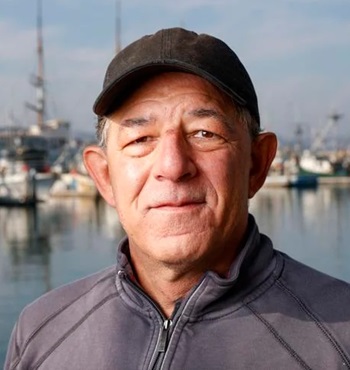 The recent postponing of the 2024 commercial crab season off the central California coast, now set to open with catch restrictions on Jan. 5, highlighted anew how vital it has been for the Water2Table Fish Co. on San Francisco’s Fisherman’s Wharf to remain flexible. Being adaptable is essential given Water2Table’s mission of buying seasonal, sustainably harvested fish pulled from the waters off the California coast by a stable of 15 to 20 small-boat operators, said Joe Conte, who founded the business with his wife in 2011. “It’s a very dynamic business,” Conte said. “We’re dealing with a wild product and getting it into people’s homes and restaurants. It’d be like somebody placing a meat order, and the vendor has to go out and shoot it.” more, >>CLICK TO READ<< 06:40
The recent postponing of the 2024 commercial crab season off the central California coast, now set to open with catch restrictions on Jan. 5, highlighted anew how vital it has been for the Water2Table Fish Co. on San Francisco’s Fisherman’s Wharf to remain flexible. Being adaptable is essential given Water2Table’s mission of buying seasonal, sustainably harvested fish pulled from the waters off the California coast by a stable of 15 to 20 small-boat operators, said Joe Conte, who founded the business with his wife in 2011. “It’s a very dynamic business,” Conte said. “We’re dealing with a wild product and getting it into people’s homes and restaurants. It’d be like somebody placing a meat order, and the vendor has to go out and shoot it.” more, >>CLICK TO READ<< 06:40
Shrimp sham: Investigation finds over 80% of “Gulf shrimp” sold on Mississippi Coast is imported
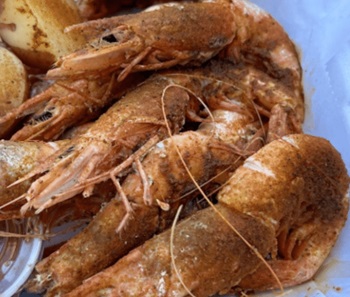 After Mississippi Gulf Coast staple restaurant Mary Mahoney’s Old French House came under fire for fraudulent branding of seafood, a new third-party investigation has found that mislabeling imported seafood is more rule than the exception for the region’s celebrated food scene. SeaD Consulting, a firm that specializes in genetic testing to monitor mislabeling and substitution fraud in the seafood industry, conducted a comprehensive investigation into the potential misrepresentation of shrimp served across coastal Mississippi. “Consumers come to the coast expecting the finest, freshest Gulf seafood, but what they’re being served often falls far short of that,” COO of SeaD Consulting Erin Williams said in a press release. “This isn’t just about mislabeling; it’s about eroding consumer trust, undercutting local business, and threatening the livelihood of hardworking Gulf shrimpers.” more, >>CLICK TO READ<< 10:56
After Mississippi Gulf Coast staple restaurant Mary Mahoney’s Old French House came under fire for fraudulent branding of seafood, a new third-party investigation has found that mislabeling imported seafood is more rule than the exception for the region’s celebrated food scene. SeaD Consulting, a firm that specializes in genetic testing to monitor mislabeling and substitution fraud in the seafood industry, conducted a comprehensive investigation into the potential misrepresentation of shrimp served across coastal Mississippi. “Consumers come to the coast expecting the finest, freshest Gulf seafood, but what they’re being served often falls far short of that,” COO of SeaD Consulting Erin Williams said in a press release. “This isn’t just about mislabeling; it’s about eroding consumer trust, undercutting local business, and threatening the livelihood of hardworking Gulf shrimpers.” more, >>CLICK TO READ<< 10:56The Truth Behind the Menu: Study finds widespread mislabeled shrimp in Coast restaurants
 Docked shrimp boats, and empty factories. It’s a sight many in the shrimp industry are dealing with because of the imports flooding the market. “It’s really hard to stay in business, and to stay afloat,” says Ocean Springs Seafood Market Inc. Vice President Bethany Fayard. And it doesn’t help that restaurants are still advertising imported shrimp as domestic. “It’s a dying industry. We have let imports basically hurt the fisherman in Mississippi,” says State Representative Brent Anderson. A seafood consulting group known as SeaD was asked by an unnamed organization to look into this issue. The results were not entirely shocking to Fayard and Anderson, who both push for stricter labeling laws in the state. “In Biloxi, we have a situation which we weren’t coming in to test for, but we discovered quite rapidly, and that is the mislabeling of the Royal Red Shrimp,” says SeaD CEO David Williams. Video, more, >>CLICK TO READ<< 08:52
Docked shrimp boats, and empty factories. It’s a sight many in the shrimp industry are dealing with because of the imports flooding the market. “It’s really hard to stay in business, and to stay afloat,” says Ocean Springs Seafood Market Inc. Vice President Bethany Fayard. And it doesn’t help that restaurants are still advertising imported shrimp as domestic. “It’s a dying industry. We have let imports basically hurt the fisherman in Mississippi,” says State Representative Brent Anderson. A seafood consulting group known as SeaD was asked by an unnamed organization to look into this issue. The results were not entirely shocking to Fayard and Anderson, who both push for stricter labeling laws in the state. “In Biloxi, we have a situation which we weren’t coming in to test for, but we discovered quite rapidly, and that is the mislabeling of the Royal Red Shrimp,” says SeaD CEO David Williams. Video, more, >>CLICK TO READ<< 08:52
Alabama eyes source-disclosure requirements for seafood, whether it was wild-caught or farmed
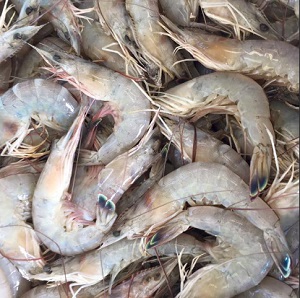 Restaurants in Alabama would be required to reveal the origin of most seafoods on their menu under a bill heading for consideration by the state House of Representatives. The measure would also require all foodservice establishments to indicate whether the fin or shellfish was farm-raised or wild-caught. The country where the fish originated would have to be disclosed via either menus or placards on the wall. The same channels would be used for differentiating between farm-raised and wild-caught proteins. The bill is intended to protect the state’s vibrant seafood industry from foreign competition. Consumers would know when they were supporting local fishermen and when their money was going toward suppliers from outside the United States. more, >>click to read<< 17:06
Restaurants in Alabama would be required to reveal the origin of most seafoods on their menu under a bill heading for consideration by the state House of Representatives. The measure would also require all foodservice establishments to indicate whether the fin or shellfish was farm-raised or wild-caught. The country where the fish originated would have to be disclosed via either menus or placards on the wall. The same channels would be used for differentiating between farm-raised and wild-caught proteins. The bill is intended to protect the state’s vibrant seafood industry from foreign competition. Consumers would know when they were supporting local fishermen and when their money was going toward suppliers from outside the United States. more, >>click to read<< 17:06

The mystery and method of ‘market price’ seafood
To better understand how the market price of a lobster roll or other local delicacy is set by the time it reaches the consumer, Times Review reached out to fishermen, retail and wholesale seafood purveyors, restaurants, chefs and major regional distributors. Only a half-dozen experts were willing to speak on the record, and most insisted on anonymity. The seeming absurdity of sending so much fresh fish on an 80-plus mile round trip to and from New York City makes more sense considering that the price fluctuations that govern the fresh seafood market are driven by a variety of factors, from the uncertainty of boat fuel and trucking costs to overheads including refrigeration, labor, food preparation and the vacillating scarcity or availability of any popular fish. >>click to read<< 12:22
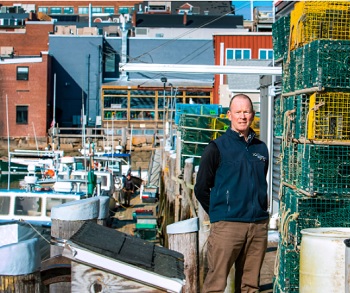
The ‘last 20 miles’: Real estate boom, new demands threaten Maine’s working waterfront
Rockland – The potential sale of three commercial waterfront properties has the potential to bring new development and tax revenue, but also great change to the town’s character. The properties are being marketed as development opportunities for hotels, restaurants, retail or office space, residential or marine usage and are listed for sale for $13.9 million, according to the New England Commercial Property Exchange. “We expect that whatever we do will be controversial,” Ed Glaser, mayor of Rockland. Elsewhere in Rockland, the nonprofit Island Institute has been sounding the alarm about shrinking coastal frontage still available for commercial use by fishermen, boatbuilders, marinas and so on. Of Maine’s 5,300 miles of coastline, just a fraction, 20 miles, is still available for working waterfront, according to the nonprofit’s 2014 report, “The Last 20 Miles.” >click to read< 13:32

How to make the most of Dungeness crab season on the Sonoma Coast
Shawn Patterson, who fishes wild Pacific king salmon during its local season, has established Lisa Lu Fishery LLC and formed a partnership with Adam King. They recently acquired the crab boat F/V Susan E from a Bodega Bay fisherman. Lisa Lu Fishery is selling live crab for $10 a pound directly to consumers and $8 a pound to restaurants. Prices are higher than they often are, but that’s the case with almost everything during the pandemic. He expects to stay in the water until the state closes the season, after the bigger boats have pulled their pots and concluded their season. “We expect to have plenty for direct-to-consumer sales and farmers market sales,” >click to read< with some nice recipes! 09:47
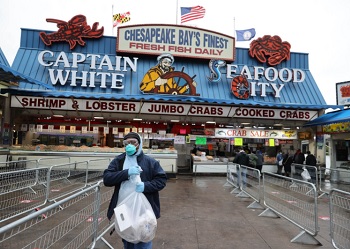
The Coronavirus pandemic could change U.S. fisheries forever. Will it be for better or for worse?!
The first symptoms appeared long before Covid-19 gained a stronghold on U.S. shores, as China went into its first lockdown and a critical export market disappeared overnight,,, Then as social distancing rules kicked in here, another major organ of the U.S. supply chain, restaurants, where most seafood purchases are made, fell limp. Many fishermen across the country have pivoted to direct-marketing models by selling their catch off their boats,,, To many in the food industry, the pandemic’s impact has exposed the fundamental vulnerabilities of a system that has long favored efficiency over resilience. >click to read< 09:48
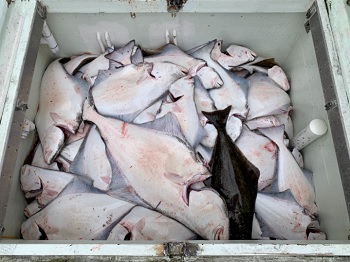
NOAA Fisheries reports on early pandemic impact on fisheries
NOAA Fisheries Friday, January 15 released a report on the economic impact on the seafood catch and recreational fishing nationwide and here in Alaska through last summer.,, Nationwide the commercial fishing industry started off 2020 with increases in revenue from seafood sales. But as the pandemic hit in March, that income dropped off 19 percent compared to the most recent five-year average. Those declines swelled to 45 percent by July. >click to read< 19:25
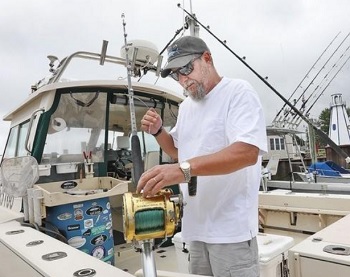
South Shore fishermen are finding demand for Atlantic bluefin tuna is way down
“It’s all about supply and demand and there’s no demand for them, so the dealers don’t want to keep buying them if they’re not able to keep selling them,” fisherman Greg Ares, based out of Green Harbor in Marshfield, said. “Maybe within the next week or two, restaurants will be opened up in the U.S., sushi restaurants, and they will purchase our bluefin tuna. Even if I get $6 a pound, that’s good enough to keep going.” American Bluefin Tuna Association President David Schalit said price has not really changed. “What has changed is the demand,” he said. “The demand is way, way off. Restaurants in the U.S. are barely open, some are maybe selling takeaway, some are still closed and in the Boston or New York areas, you see tables on the sidewalk.” >click to read< 15:14
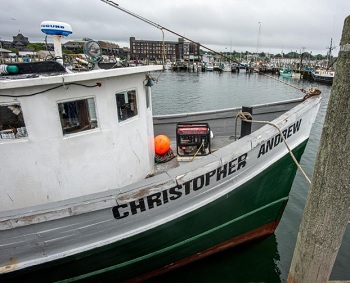
Coronavirus snagged the R.I. fishing industry, so state let fishermen sell direct to the public
In the spring, when the state closed restaurants to stop the spread of the coronavirus, fishermen were hit hard. Prices dropped dramatically. In some cases, wholesalers stopped buying, and fishermen had no place to sell their catch. To help fishermen navigate this storm, the state temporarily changed some regulations to allow them to peddle their catches directly to consumers, fish markets and restaurants, instead of selling exclusively to wholesalers. Fifteen Rhode Island fishermen are “actively using” their direct-sale licenses, according to Nichole Ares, principal biologist for the DEM’s marine fisheries division. The fishermen have sold about 13,000 pounds of fish for a total of about of $40,000. More than 160 fishermen applied for the licenses,,, photo’s, >click to read< 18:43
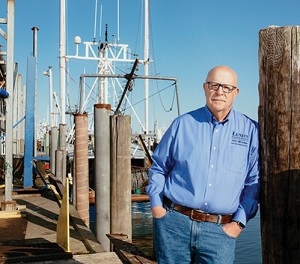
New Jersey’s Commercial Fishing Industry Struggles to Stay Afloat
In the wake of the pandemic, the industry—the fifth largest in the country—has been in rough waters. Will July and August bring relief? Atlantic Cape Fisheries, of which Sam Martin is chief operating officer, is a large commercial fishery as well as New Jersey’s largest producer of farmed oysters. “Last year we sold 2.5 million oysters, and we planned to sell 5 million this year, but sales so far are down about 80 percent compared to last year.” The bottleneck that Martin spoke of has throttled not only oystering, but New Jersey’s entire commercial fishing industry, “When I tell my boats to go fishing, I tell them, ‘Don’t bring in a lot,’” says David Tauro, general manager of the docks at the Belford Seafood Co-Op Belford, founded in 1953, is the smallest of New Jersey’s six commercial fisheries, but its pain is shared by the larger ones, such as Viking Village in Barnegat Light and Lund’s Fisheries in the state’s largest commercial fishing port, Cape May. >click to read< 17:53
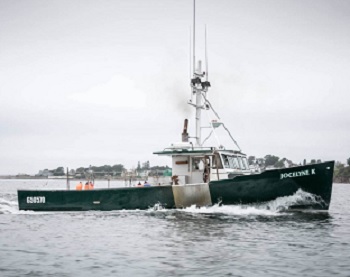
I’m a Maine lobsterman. I leave a lot of my life up to chance. But I don’t know if I can handle this level of uncertainty.
Herman Coombs is a lobster fisherman in Orrs Island, Maine. He’s been fishing since elementary school, he says, and went full-time after high school. In all those years, he can think of two times when the price of lobster has been any lower—in 2001, in the weeks after 9/11, and during the Great Recession. With restaurants in Portland and Lewiston—Maine’s largest cities—still closed for dine-in seating, and the state’s crucial tourism industry sure to take a massive hit this summer, he’s worried. “Right now, we’re only hauling about once every two weeks. That’s because of the weather. We’re getting a lot of wind in the afternoons, which ends up being pretty gusty, and isn’t a lot of fun. And the prices.,, >click to read< 11:19
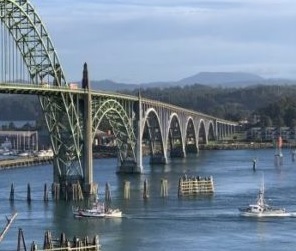
In Newport, a coronavirus outbreak spreads to local economy
Pacific Seafood ceased operations at all five of its Newport plants. The Oregon Health Authority said the outbreak is contained to Lincoln County and that risk to the public is low. But Newport Mayor Dean Sawyer said most of those who tested positive are locals. The town’s economy is hurting again without a major fish buyer and supplier. And businesses are shutting back down to try to slow the spread of the virus. “They live here, they work here, they’re community-based people,” Sawyer said. “And, of course, the problem with that is that people live and work with people that work in other industries.” >click to read< 12:16
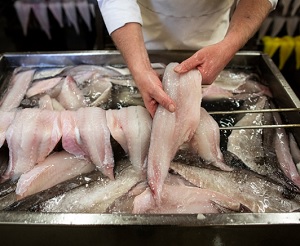
Coronavirus: Commercial fishing industry on the ropes as pandemic-era shoppers avoid seafood
Fisherman Marty Scanlon has not returned to his Long Island home since leaving for North Carolina at the beginning of the coronavirus pandemic in New York. Scanlon, a longliner captain from Hauppauge left for North Carolina in early March — roughly the same time the first case of Covid-19 emerged in Manhattan. In the weeks that followed, Gov. Andrew Cuomo ordered most businesses to close, effective March 22, casting a pall over New York City restaurants in a once-bustling culinary capital. Business for Scanlon has been brutal ever since. “We basically don’t have the money to go home,” Scanlon said, over the phone. “We can’t go home til we pay our bills.” >click to read< 08:32
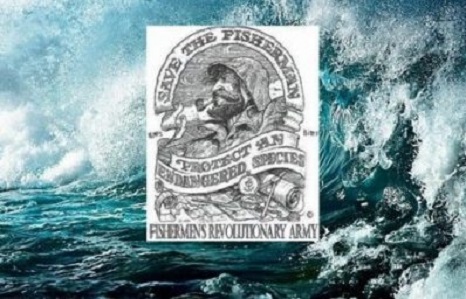
Tell Your Congressmen and Senators: Our US Fishing Industry Faces The Coronavirus Disaster
With the Coronavirus being spread around the world and nations reacting to this threat in many different ways, from doing nothing, to closing the borders and full quarantines, the unintended effects of such government actions have yet to be fully felt. Granted the stock market has lost 30% in value in just 3 weeks time, the average American really doesn’t feel that unless he is living on his investment returns. With the closing of schools, and restaurants and any places of public gatherings an enormous crisis is being created because many people are being put out of work and some of them may not have a business to come back to when the crisis is over. The Coronavirus may topple an empire if we let it. >click to read< 06:17
Slave-labor shrimp report spurs calls for boycott of U.S. supermarkets, restaurants
 “All of us may find ourselves eating a slave-made product without knowing it, but once we know it, we all have a moral obligation, I believe, to make a personal decision to boycott it,” said New Jersey Republican Congressman Chris Smith, a member of the House Foreign Relations Committee. Said Mark Lagon, president of the group Freedom House: “This isn’t a matter of low pay or crummy working conditions. This isn’t a matter of saving lots of money to choose the product that is made by cutting corners. This is the flagrant abuse of fellow human beings. … Americans won’t stand for that.” Read the article here 11:18
“All of us may find ourselves eating a slave-made product without knowing it, but once we know it, we all have a moral obligation, I believe, to make a personal decision to boycott it,” said New Jersey Republican Congressman Chris Smith, a member of the House Foreign Relations Committee. Said Mark Lagon, president of the group Freedom House: “This isn’t a matter of low pay or crummy working conditions. This isn’t a matter of saving lots of money to choose the product that is made by cutting corners. This is the flagrant abuse of fellow human beings. … Americans won’t stand for that.” Read the article here 11:18






 Act 148 of the 2024 regular legislative session brought sweeping changes to laws affecting restaurants and other food establishments in an effort to protect Louisiana’s struggling domestic seafood industry. However, the new law, which took effect Jan. 1, could undergo some clarification revisions when lawmakers reconvene this spring. At issue are several provisions concerning menu and labeling requirements. One provision in the new law requires any food service establishment that serves foreign crawfish or shrimp to print a disclaimer on its menu: “Some items served at this establishment may contain imported crawfish or shrimp. Ask for more information.” If the establishment does not use a menu, it must print the disclaimer on a sign at the entrance of the establishment.
Act 148 of the 2024 regular legislative session brought sweeping changes to laws affecting restaurants and other food establishments in an effort to protect Louisiana’s struggling domestic seafood industry. However, the new law, which took effect Jan. 1, could undergo some clarification revisions when lawmakers reconvene this spring. At issue are several provisions concerning menu and labeling requirements. One provision in the new law requires any food service establishment that serves foreign crawfish or shrimp to print a disclaimer on its menu: “Some items served at this establishment may contain imported crawfish or shrimp. Ask for more information.” If the establishment does not use a menu, it must print the disclaimer on a sign at the entrance of the establishment. 




























